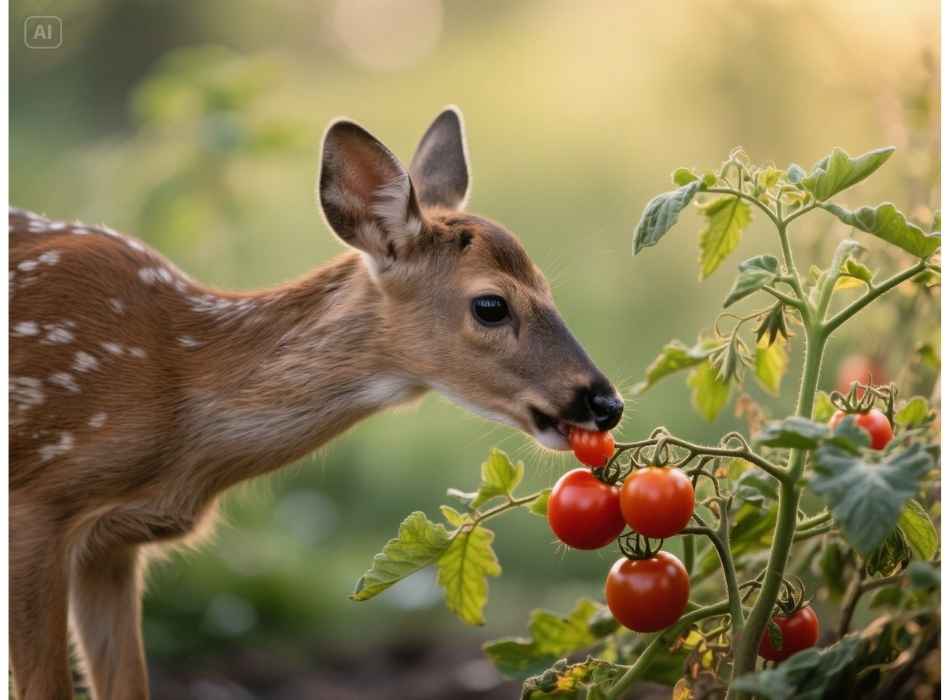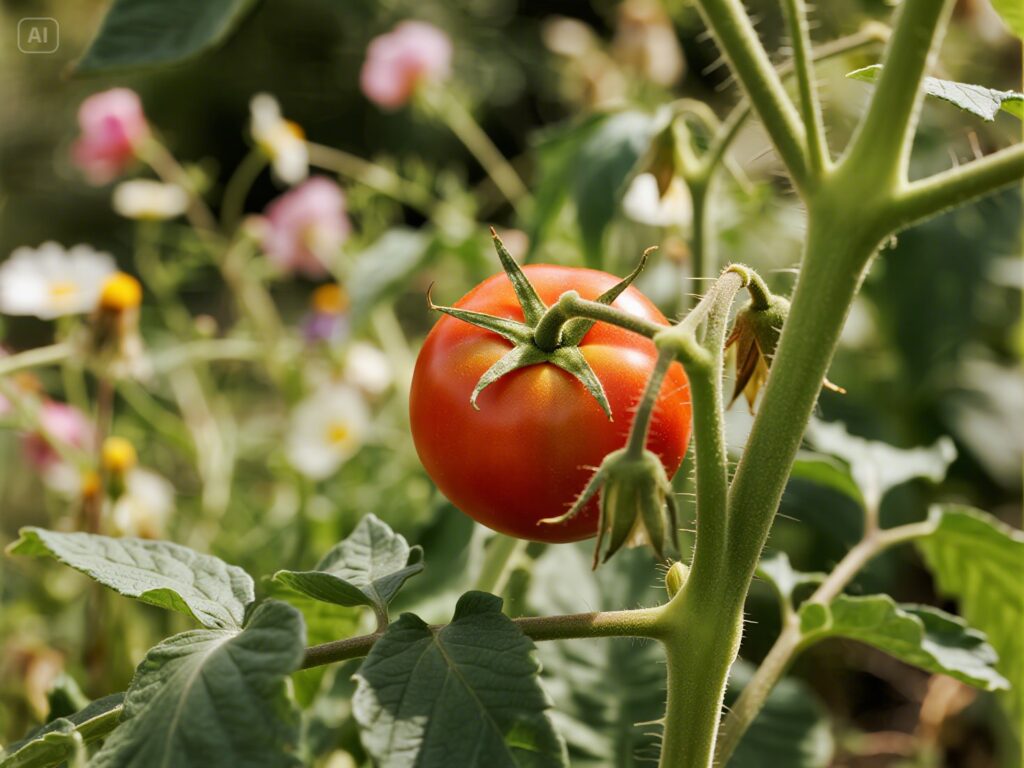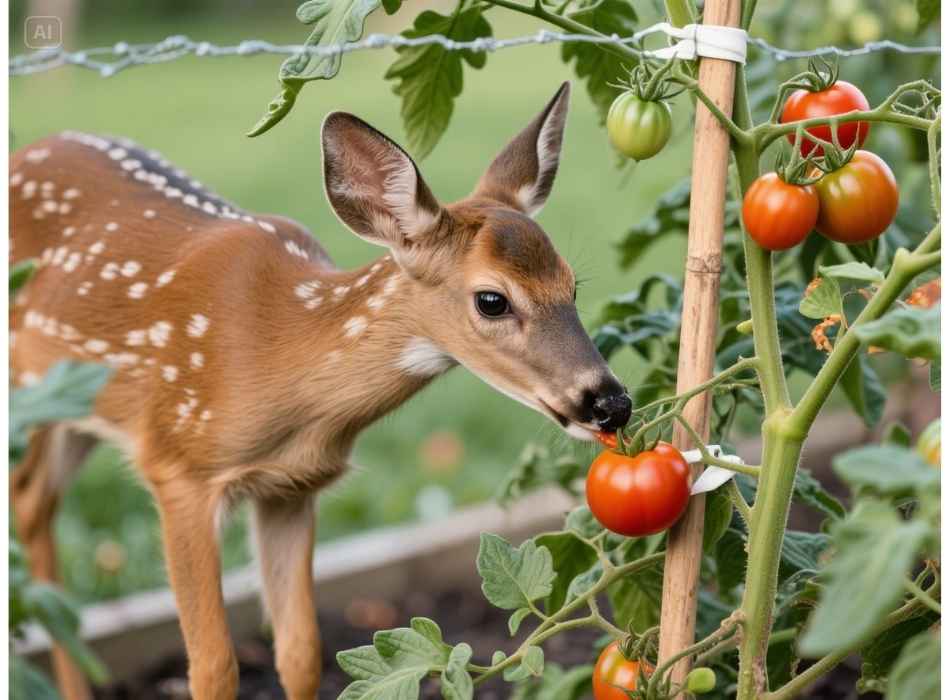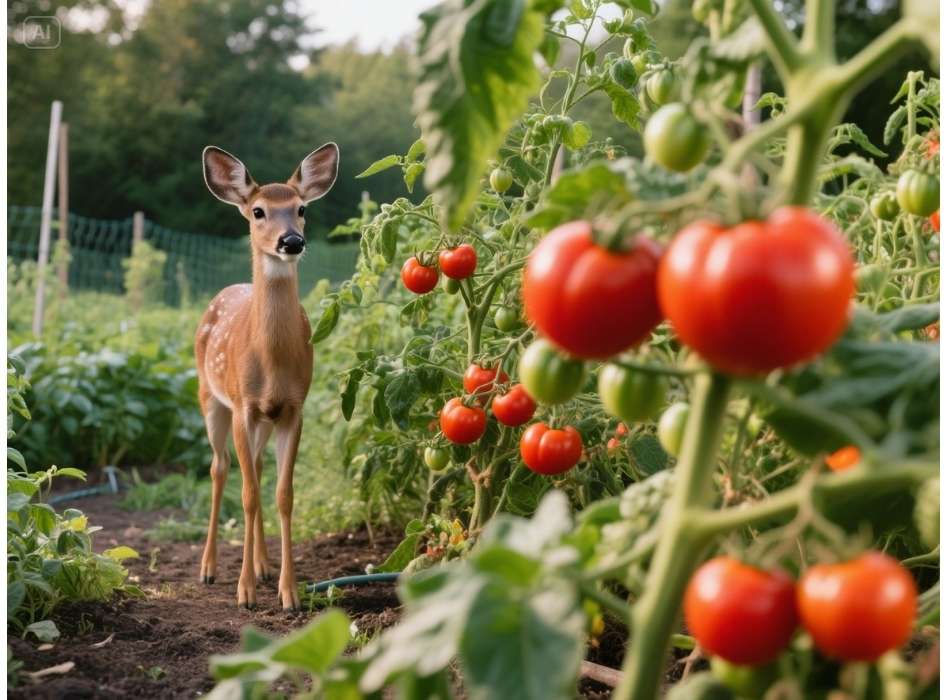Gardens are a place of growth and tranquillity, but for many gardeners, they can also become a battleground. Deer, with their graceful demeanour, can quickly turn into unwelcome visitors, especially when your prized tomato plants are on the menu. But do deer actually like tomato plants? And if so, how can you protect your garden from becoming their all-you-can-eat buffet? Let’s dig into the answer and explore effective ways to safeguard your greens.
Do Deer Eat Tomato Plants?

Yes, deer do eat tomato plants, but they don’t fall into the category of their favourite treats. Deer are notoriously opportunistic feeders, meaning they’ll munch on whatever is available, especially if they’re hungry. Tomato plants, with their tender leaves, juicy fruits, and soft stems, can be an appealing option for deer when tastier, more nutrient-rich plants are scarce.
While the plant’s slightly rough texture and strong-smelling foliage might deter some deer, others will happily munch away, particularly in late spring or summer. During periods of food scarcity, deer become far less picky, so if you’re living in an area with a substantial deer population, your garden could quickly attract nearby wildlife.
How Do You Know Deer Are Eating Your Tomato Plants?

Deer leave telltale signs when they nibble on your plants. Look for these clues in your garden:
- Ragged, torn edges on leaves and stems caused by their lack of upper front teeth.
- Missing plants or fruits, particularly if they’ve been neatly cropped at about nose-to-ground level for a deer.
- Hoofprints around your garden beds are identifiable by their unique cloven-shaped marks.
- Droppings, which are small and pellet-shaped, are often found near areas where deer are frequent.
If your tomatoes meet these conditions, there’s a good chance deer are making themselves at home in your garden.
Why Are Tomato Plants Attractive to Deer?
- Easily Accessible: Tomato plants often grow in open, unfenced garden beds, making them easy targets for deer.
- Juicy and moist: Tomato fruits’ high water content is particularly enticing during hot, dry summer months when water sources are scarce.
- Tender Foliage: Young tomato plants, with their softer leaves and shoots, are easier for deer to bite through.
While deer may love tomatoes under certain circumstances, they’re unlikely to go to great lengths to access them if other food sources, like flowers or shrubs, are readily available.
Deer-Resistant Plants vs. Tomato Plants

If you’re wondering whether tomatoes are classified as “deer-resistant,” the answer is no. However, some plants tend to deter deer due to their strong scent, bitter taste, or thorny foliage. Consider incorporating the following deer-resistant plants around your tomato beds to help minimize damage:
- Herbs like rosemary, lavender, and thyme
- Flowers such as marigolds,
- daffodils, and foxgloves
- Thorny bushes like barberry or holly
While planting these will not guarantee that deer will stay away, they can act as a natural buffer and reduce the risk of deer roaming freely through your garden.
How to Protect Your Tomato Plants From Deer

Now that we know deer occasionally indulge in tomato plants, the question remains: how can you keep them out of your garden? Here are some practical and proven methods:
1. Install a Physical Barrier
The most effective way to protect your tomato plants is by putting up a sturdy fence around your garden. To keep deer out:
- Make sure the wall is at least 8 feet high. Deer are excellent jumpers and can easily clear shorter barriers.
- Opt for a solid or dual-layer fence, as deer may attempt to squeeze through gaps in traditional wire fencing.
- For added protection, consider an angled wall that leans outward, making it harder for deer to jump over or climb.
2. Use Deer Repellents
Deer are sensitive to strong smells and tastes, which makes repellents a reliable option. Try these:
- Store-Bought Deer Repellents: Products made with ingredients like putrescent egg solids or predator urine create a scent that deer dislike. Apply these regularly, especially after rain, to maintain effectiveness.
- Homemade Solutions: Mix water with garlic, cayenne pepper, or vinegar to create a natural spray that wards off deer.
- Bar Soap or Hair: Hang bars of strongly scented soap or bags of human hair along the perimeter of your garden. Deer tend to avoid human-like scents.
3. Create Noise or Movement
Deer are easily startled by noise and motion. Consider installing:
- Motion-Activated Sprinklers that spray water when they sense movement.
- Wind Chimes or Reflective Tape to create both sound and visual deterrents.
- Ultrasonic Devices that emit high-frequency noises unpleasant to deer but inaudible to humans.
4. Opt for Raised Beds or Containers
If space allows, planting tomatoes in elevated planters or container gardens can reduce the chance of deer reaching them. For added safety, place these on patios or decks.
5. Companion Planting
Companion plants can help keep deer away while also benefiting your tomatoes. Consider planting strong-smelling herbs like basil, mint, or oregano near your tomatoes. These herbs not only repel deer but also help deter common pests like aphids.
6. Introduce Gardening Netting
Protect your tomato plants with lightweight gardening netting. Drape the net directly over the plants or create a small frame to keep the net lifted and secure. This method is particularly helpful for safeguarding ripening fruits on the vine.
Preventative Measures Pay Off
A beautiful garden and thriving tomato plants don’t have to be victimized by deer. By taking proactive measures, you can discourage deer from entering your space while still enjoying a lush, bountiful harvest. Not every solution will work universally, so it may take some trial and error to figure out what works best in your area.
The Next Step for Your Tomato Garden
If you’re struggling to keep deer at bay, now’s the time to act. Start by implementing one or more of the above strategies to protect your tomato plants. With a little effort and creativity, you can keep your garden safe while giving the deer in your area reason to look elsewhere for their next meal.
Happy gardening!











